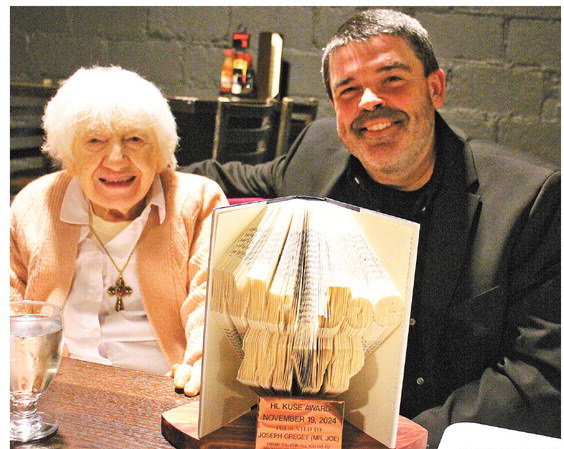Trees are good for looks, but are they bad for business?
Lush trees line the Main Street walks of Gilman, and although eye-catching, have been a bone of contention of late. Steve and Deanna Bornheimer brought an issue to the Gilman Village Board June 9, where they questioned what is going to be done about the tree in front of their property – Grand Central Station Bar& Grill. The Bornheimers had previously asked the village look at the tree, as they believed it is causing heaving on the sidewalk.
The question was turned over to DNR forester Don Kissinger, whose recommendation was to leave the tree where it is, as he felt the sidewalk was not compromised by the roots.
S. Bornheimer wondered if someone trips and is injured in front of the business, and tries to sue the couple for damages, is it the business owner’s option to bring that lawsuit to the village to take care of? Village clerk Candice Grunseth says someone can certainly bring a claim to the village for them to send onto their insurance agency.
“If it’s for frost, Mother Nature, we have municipal immunity,” said Grunseth.
“So, it’s in the village’s best interest to leave all these trees, as is, and let the sidewalks go, with the up and down, as these trees get bigger?” said S. Bornheimer.
Kissinger’s email says the tree was planted correctly, in his estimation, and the amount of sidewalk heaving seems miniscule, with about twice the amount of rooting space provided, than what is normally afforded to trees in a right-of-way. S. Bornheimer also mentioned that he thinks the tree blocks businesses as people drive down Main Street.
“Are we going to do anything to try to help get exposure or are we just going to let trees cover up the fronts of businesses?” asked S. Bornheimer.
Village president Jane DeStaercke said that was not something that was talked about, that she was aware of. However, village trustee Eileen Grunseth said the board had been approached some years ago, about a tree potentially blocking a separate business, but that no action was taken.
“I don’t see how it’s going to improve the looks of Main Street by removing a tree…it’s taken a number years to bring it to what it is…and a lot of work went into it,” said E. Grunseth.
“No businesses and pretty trees, what is that bringing you?” said D. Bornheimer.
E. Grunseth pointed out that Kissinger’s email says having a larger tree in the front is an advantage for a business, as it will provide a nice canopy of shade when it reaches full maturity. Kissinger also said it is possible to remove the tree and go with a smaller size tree, such as a Japanese tree lilac or chokecherry, but that those varieties might not “stand up” to the usual abuse that trees outside of bars are subjected.
Village trustee Greg Steinbach says the last time the village cut down trees, there was an “army” of people who were upset that the beautiful trees were removed.
“You can never keep everyone happy,” he said.
S. Bornheimer said he understands that, but that he and other business owners have put money into the community to advance it.
“We’re not asking you to log off the whole community, we’re asking for one tree,” said S. Bornheimer.
C. Grunseth said no one on the village board is denying that sidewalks are “moving,” but experts have agreed it is because of nature. DeStaercke said if the Bornheimers wish to pursue the matter, they should submit photos showing any damage or issues, for closer scrutiny.
Kissinger also recommended that if they decide to leave it there, the ash tree in front of Grand Central Station needs to be treated for Emerald Ash Borer, as it will likely not make it to maturity.
To coincide with the tree discussion, a Main Street Memorial Trees Policy was adopted, stating that a memorial tree application must be filed with the clerk’s office for approval from the board to plant on public property. The village board and Tree Board have sole control, over the planting or removal of a memorial tree. Removal would occur from natural disaster and/or the health condition of the tree.
The DNR is also to be consulted before any action is taken, with a replacement tree in that same location.
“This is just simply reflecting what we’ve always done, regarding the planting and removal,” said DeStaercke.
S. Bornheimer also wanted to address something that was bothering him, after the village and he worked on fixing the alley behind his business, as well as Romig’s Hardware. Once the project was completed, S. Bornheimer said he had a problem that E. Grunseth was questioning the use of pipe on his personal property that was purchased by the village. S. Bornheimer says he couldn’t order the specific size of the pipe for the project and paid the cost for any materials on his personal property.
E. Grunseth agreed that was the case and says in her questioning, she only wanted to straighten out the bill so the cost could be split between the businesses and the village, for each portion of the work. The bill for the project came through the Finance Committee, which was approved, but E. Grunseth wanted clarification, so she approached Darrell Romig and he explained how the costs were broken down.
S. Bornheimer says the problem he has, is that E. Grunseth did not come directly to him and ask her questions. E. Grunseth said it was because the bill came through Romig’s, that she didn’t think it was an issue and needed to be taken to anyone but Romig.
“As far as I was concerned, all was good,” she said. “That was the end of that.”
It wasn’t just the pipe S. Bornheimer wanted to address, as he said people have told him E. Grunseth questioned what rocks he had used and where, but E. Grunseth says the person(s) who informed him of that was mistaken and she had no knowledge of the rocks in question.
“I heard nothing about that,” said E. Grunseth.
DeStaercke apologized for any misunderstanding between the Bornheimers and the board, and said she is glad they brought the matter to the trustees’ attention.
“We did know that you were volunteering a lot of time and services,” said DeSatercke of the alley project.
Another project has yet to be completed since the sewer break outside the library/village hall the previous month, and is no closer to being resolved, as approval for work is in limbo at a state level.
“I think we all understand, once they start digging, if they can’t just sleeve the pipe, we’ve got to be ready to dig into the street and take care of that right of way,” said DeStaercke. “The state permits seem to be the hold-up. I don’t know where we stand.”
Rick Johnson, director of public works, says it would be easier and cheaper to “send out” the work to McSloy Street, if the crews are unable to insert a sleeve to fix the sewer problem. Otherwise, the work will take place across the highway, which would require sign crews, detours and a lot of hassle.
“It’s more difficult than you think,” said Johnson.
It could be a month or more before the work can be started, which no one wanted to hear.
“We have a public building, we’ve got to do something,” said DeStaercke.
One good thing that came out of the sewer fiasco, was that the village instated a Records Retention Ordinance. Because records from as far back as the 1960s were contaminated in the village basement storage room from the back-up, the village officials had to write down what was in each box and confirm that the records were contaminated, with the cleaning company that was hired. Afterward, permission had to be received from the State Historical Society to dispose of the obsolete records.
“And some of these were items that had been down there for umpteen years, and were wet once before,” said C. Grunseth.
With the new ordinance, after a seven-year period, certain records can be disposed of and are now on a schedule to accomplish that, without need permission from the historical society.
“And now, we have a better handle on what we have to keep and what we can get rid of,” said DeStaercke.
She also mentioned that outdoor landscaping of the library grounds is underway, with the Friends of the Library incurring the cost.
DeStaercke also reminded residents that lawns must be mowed in a timely fashion and kept in good order within the village.
“I hope people are aware, that if they don’t take care of these, there are citations that can be issued,” she said.


